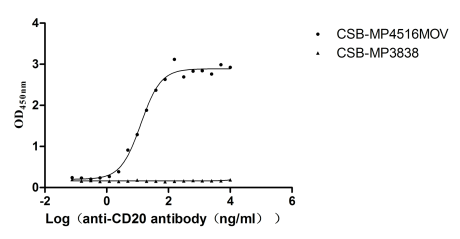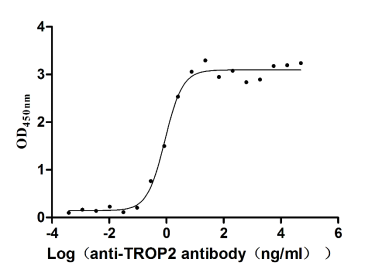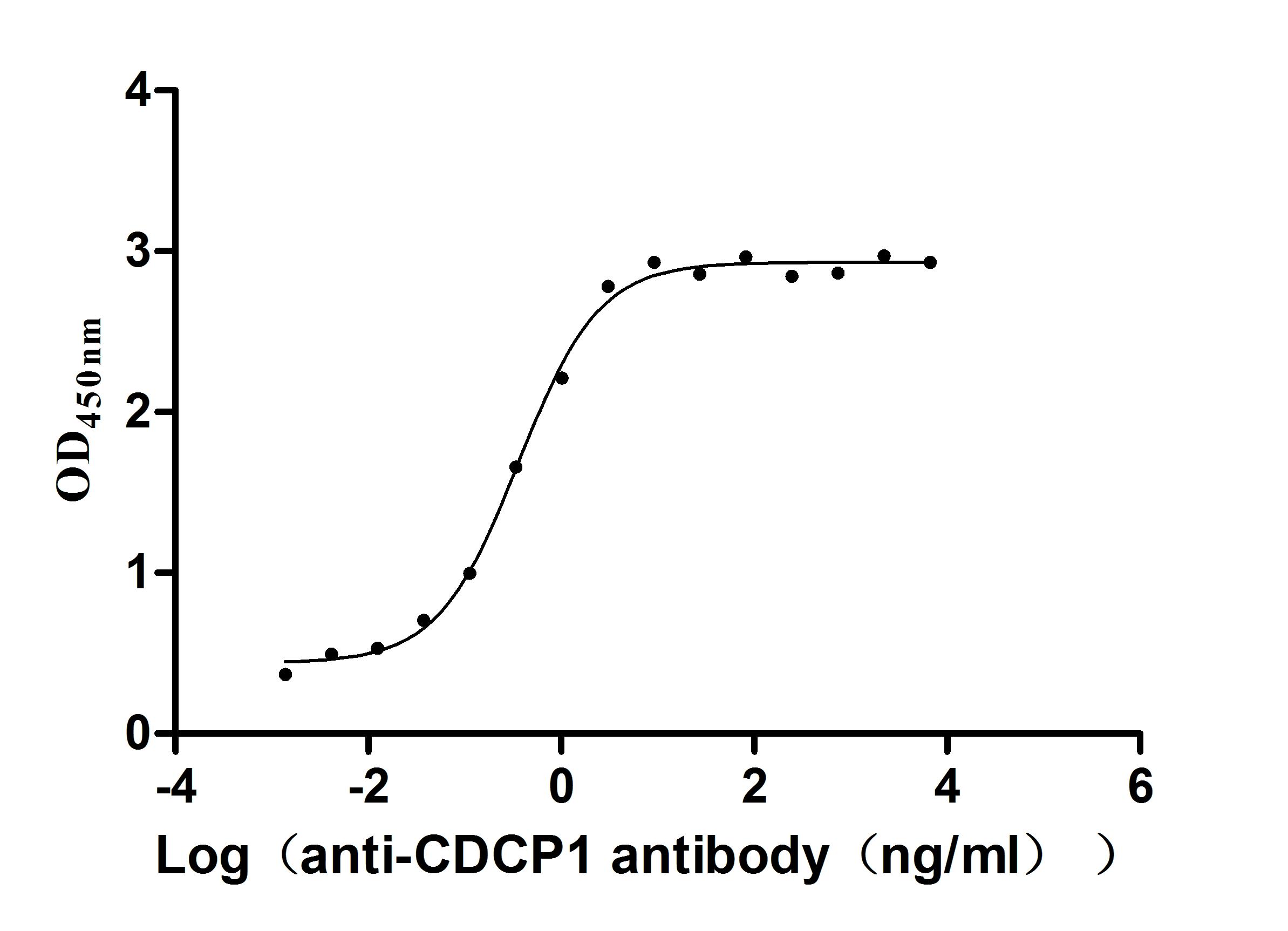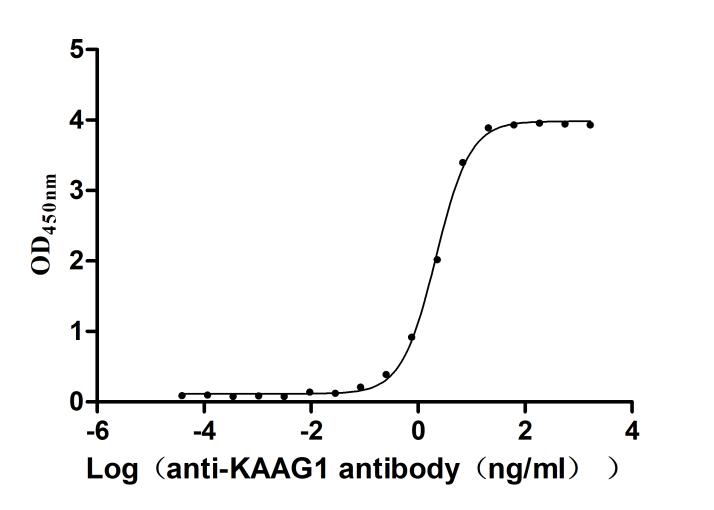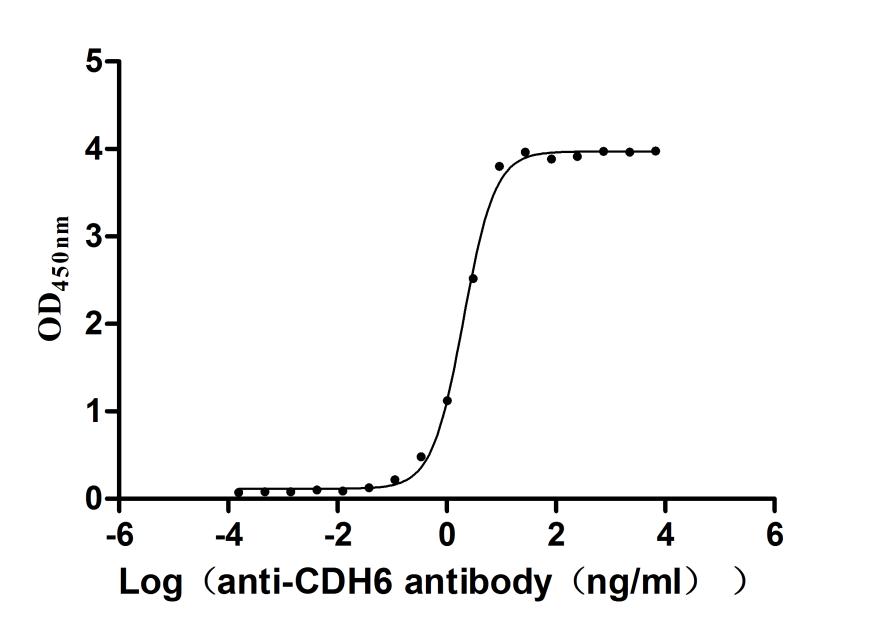Recombinant Human Monoglyceride lipase (MGLL)
-
中文名稱(chēng):人MGLL重組蛋白
-
貨號(hào):CSB-EP013787HU
-
規(guī)格:¥1344
-
圖片:
-
其他:
產(chǎn)品詳情
-
純度:Greater than 90% as determined by SDS-PAGE.
-
基因名:MGLL
-
Uniprot No.:
-
別名:EC 3.1.1.23; HU K5 ; HU-K5; HUK5 ; Lysophospholipase homolog; Lysophospholipase like; Lysophospholipase-like; MAGL; MGL; MGLL; MGLL_HUMAN; Monoacylglycerol lipase; Monoglyceride lipase
-
種屬:Homo sapiens (Human)
-
蛋白長(zhǎng)度:Full Length
-
來(lái)源:E.coli
-
分子量:60.3kDa
-
表達(dá)區(qū)域:1-303aa
-
氨基酸序列MPEESSPRRTPQSIPYQDLPHLVNADGQYLFCRYWKPTGTPKALIFVSHGAGEHSGRYEELARMLMGLDLLVFAHDHVGHGQSEGERMVVSDFHVFVRDVLQHVDSMQKDYPGLPVFLLGHSMGGAIAILTAAERPGHFAGMVLISPLVLANPESATTFKVLAAKVLNLVLPNLSLGPIDSSVLSRNKTEVDIYNSDPLICRAGLKVCFGIQLLNAVSRVERALPKLTVPFLLLQGSADRLCDSKGAYLLMELAKSQDKTLKIYEGAYHVLHKELPEVTNSVFHEINMWVSQRTATAGTASPP
Note: The complete sequence may include tag sequence, target protein sequence, linker sequence and extra sequence that is translated with the protein sequence for the purpose(s) of secretion, stability, solubility, etc.
If the exact amino acid sequence of this recombinant protein is critical to your application, please explicitly request the full and complete sequence of this protein before ordering. -
蛋白標(biāo)簽:N-terminal GST-tagged
-
產(chǎn)品提供形式:Liquid or Lyophilized powder
Note: We will preferentially ship the format that we have in stock, however, if you have any special requirement for the format, please remark your requirement when placing the order, we will prepare according to your demand. -
緩沖液:If the delivery form is liquid, the default storage buffer is Tris/PBS-based buffer, 5%-50% glycerol.
Note: If you have any special requirement for the glycerol content, please remark when you place the order.
If the delivery form is lyophilized powder, the buffer before lyophilization is Tris/PBS-based buffer, 6% Trehalose. -
儲(chǔ)存條件:Store at -20°C/-80°C upon receipt, aliquoting is necessary for mutiple use. Avoid repeated freeze-thaw cycles.
-
保質(zhì)期:The shelf life is related to many factors, storage state, buffer ingredients, storage temperature and the stability of the protein itself.
Generally, the shelf life of liquid form is 6 months at -20°C/-80°C. The shelf life of lyophilized form is 12 months at -20°C/-80°C. -
貨期:Basically, we can dispatch the products out in 1-3 working days after receiving your orders. Delivery time may differ from different purchasing way or location, please kindly consult your local distributors for specific delivery time.Note: All of our proteins are default shipped with normal blue ice packs, if you request to ship with dry ice, please communicate with us in advance and extra fees will be charged.
-
注意事項(xiàng):Repeated freezing and thawing is not recommended. Store working aliquots at 4°C for up to one week.
-
Datasheet & COA:Please contact us to get it.
相關(guān)產(chǎn)品
靶點(diǎn)詳情
-
功能:Converts monoacylglycerides to free fatty acids and glycerol. Hydrolyzes the endocannabinoid 2-arachidonoylglycerol, and thereby contributes to the regulation of endocannabinoid signaling, nociperception and perception of pain. Regulates the levels of fatty acids that serve as signaling molecules and promote cancer cell migration, invasion and tumor growth.
-
基因功能參考文獻(xiàn):
- Using a multimethod approach, the authors show that the dynamically relevant Trp-289 and Leu-232 residues serve as communication hubs within an allosteric protein network that controls signal propagation to the active site, and thus, regulates active-inactive interconversion of human MGL. PMID: 29379013
- RNA interference, specific pharmacological inhibitor JZL-184 and gene knock-in of MAGL were utilized to investigate the effects of MAGL on hepatocellular carcinoma (HCC) cell proliferation, apoptosis, and invasion. MAGL played important roles in both proliferation and invasion of HCC cells. PMID: 27767105
- This review summarizes the basics of monoglyceride metabolism and provides an overview on the therapeutic potential of MGL. [Review] PMID: 28213089
- MGLL may have a role in progression of gastrointestinal stromal tumors PMID: 27366945
- the upregulation of MAGL in hepatocellular carcinoma cells promoted cell growth and invasiveness abilities, and mediated epithelial-mesenchymal transition PMID: 27884159
- we clarify the key role of Phe159 and Ile179, two conserved residues within the lid domain, in regulating substrate specificity in MAGL. We conclude by proposing that other structurally related lipases may share this lid-domain-mediated mechanism for substrate specificity. PMID: 28088576
- the presence and differential distribution of fatty acid amide hydrolase (FAAH) and monoglyceride lipase (MGLL) in relation to CB1 during the maturation of human oocytes, was investigated. PMID: 26948343
- there was evidence that MGLL rs604300 genotype interacts with early life adversity to predict threat-related basolateral amygdala habituation, a neural phenotype linked to the endocannabinoid system and addiction PMID: 26595473
- This study unravels a novel mechanism of SND1 function and identifies MGLL as a unique tumor suppressor for HCC. MGLL might function as a homeostatic regulator of Akt restraining its activation. PMID: 26997225
- The data highlight specific inter-residue interactions within hMGL PMID: 26555264
- Monoacylglycerol lipase sulfenylation might act as an intrinsic neuroprotective mechanism by potentiating 2-AG signaling at CB1 receptors. PMID: 26000748
- Molecular dynamics and nudged elastic band simulations were used to explore the conformational transition pathway of the helix alpha4 of human monoacylglycerol lipase. PMID: 25078047
- role of monoacylglycerol lipase (MAGL) in the cancer progress PMID: 24633487
- Our findings establish that MAGL promotes metastases in nasopharyngeal carcinoma PMID: 25120746
- In subcutaneous adipose tissue, DAGL-a mRNA was upregulated and fatty acid amide hydrolase (FAAH) and monoacylglycerol lipase (MAGL) mRNAs were down-regulated in obese subjects, but the diets had no influence. PMID: 24616451
- In obese humans, FAAH or MGL activity in adipocytes is not affected by diabetes, dyslipidaemia or other markers of metabolic dysfunction. PMID: 24593280
- Mutation of Cys242 was also found to impair inhibition of monoacylglycerol lipase. PMID: 24368842
- MGL interaction with a phospholipid membrane bilayer induces regional changes in the enzyme's conformation that favor its recruiting lipophilic substrate from membrane stores to the active site resulting in enhanced MGL catalytic activity. PMID: 23553709
- Data indicate that N,N-dimethyl-5-(4-phenoxyphenyl)-2H-tetrazole-2-carboxamide inhibited monoacylglycerol lipase (MAGL) with IC50 0.028 muM. PMID: 23455058
- MGL expression declines after peaking in infancy. PMID: 22827915
- results suggest that MGL plays a negative regulatory role in phosphatidylinositol-3 kinase/Akt signaling and tumor cell growth PMID: 22349814
- No association was found between our inflammatory bowel disease cohort and the candidate single nucleotide polymorphisms for MGL (CD/HC: P=0.37 and UC/HC: P=0.25). PMID: 22664939
- MAGL is elevated in androgen-independent versus androgen-dependent human prostate cancer cell lines, and pharmacological or RNA-interference disruption of this enzyme impairs prostate cancer aggressiveness. PMID: 21802006
- High MAGL is associated with colorectal cancer. PMID: 21543155
- Data present a high-resolution structure of a ligand-bound, soluble form of human monoglyceride lipase. PMID: 21308848
- One interval in the FAAH promoter and three intervals in the MGLL gene were associated with high BMI. PMID: 21118518
- Arachidonoylglycerol (2-AG) is the most abundant endocannabinoid in the brain and is believed to be hydrolyzed primarily by serine hydrolase monoacylglycerol lipase (MAGL) in a transgenic mouse model with targeted disruption of MAGL. PMID: 20855465
- Identification of an active site hydrogen bond network in human monoacylglycerol lipase. PMID: 20464001
- An apolar helix covering the active site also gives structural insight into the amphitropic character of MAGL, and likely explains how MAGL interacts with membranes to recruit its substrate. PMID: 19957260
- MGL shares the classic fold of the alpha/beta hydrolase family but depicts an unusually large hydrophobic occluded tunnel with a highly flexible lid at its entry and the catalytic triad buried at its end. PMID: 19962385
- Study shows that monoacylglycerol lipase (MAGL) is highly expressed in aggressive cancer cells and primary tumors; it regulates a fatty acid network enriched in oncogenic signaling lipids that promotes migration, invasion, survival, and tumor growth. PMID: 20079333
- not associated with susceptibility to alcoholism in a Japanese population. PMID: 17621164
- full proteomic characterization of hMGL was carried out, which showed (1) an absence of intramolecular disulfide bridges in the functional, recombinant enzyme and (2) the post-translational removal of the enzyme's N-terminal methionine PMID: 18452279
- Identification of amino acids critical to the catalytic activity PMID: 18721756
- Gene Ontology analysis indicated a significant alteration of oxygen transport (increased hemoglobin gene expression) and lipid metabolism [including monoglyceride lipase and low density lipoprotein receptor-related protein 5 (LRP5) gene]. PMID: 19233690
顯示更多
收起更多
-
亞細(xì)胞定位:Cytoplasm, cytosol. Membrane; Peripheral membrane protein.
-
蛋白家族:AB hydrolase superfamily, Monoacylglycerol lipase family
-
組織特異性:Detected in adipose tissue, lung, liver, kidney, brain and heart.
-
數(shù)據(jù)庫(kù)鏈接:
Most popular with customers
-
Recombinant Human Prolactin receptor (PRLR), partial (Active)
Express system: Mammalian cell
Species: Homo sapiens (Human)
-
Recombinant Mouse Retinol-binding protein 4 (Rbp4) (Active)
Express system: Mammalian cell
Species: Mus musculus (Mouse)
-
Recombinant Human Microtubule-associated protein tau (MAPT) (Active)
Express system: Mammalian cell
Species: Homo sapiens (Human)
-
Recombinant Macaca fascicularis Membrane spanning 4-domains A1 (MS4A1)-VLPs (Active)
Express system: Mammalian cell
Species: Macaca fascicularis (Crab-eating macaque) (Cynomolgus monkey)
-
Recombinant Human Tumor-associated calcium signal transducer 2 (TACSTD2), partial (Active)
Express system: Mammalian cell
Species: Homo sapiens (Human)
-
Recombinant Human CUB domain-containing protein 1 (CDCP1), partial (Active)
Express system: Mammalian cell
Species: Homo sapiens (Human)
-
Recombinant Human Kidney-associated antigen 1 (KAAG1) (Active)
Express system: E.coli
Species: Homo sapiens (Human)
-
Recombinant Mouse Cadherin-6(Cdh6),partial (Active)
Express system: Mammalian cell
Species: Mus musculus (Mouse)

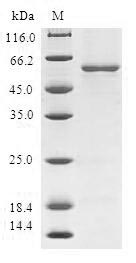

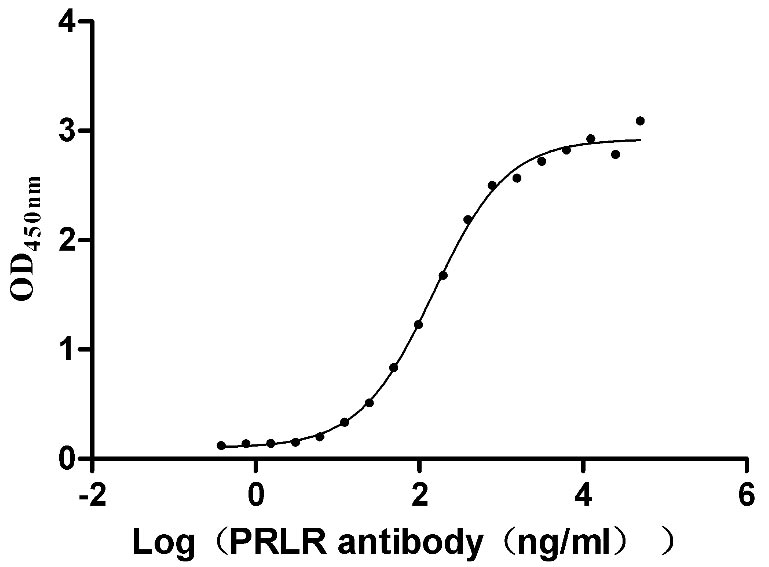

-AC1.jpg)
